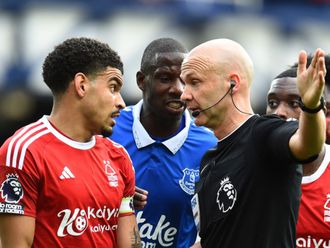We are often told that footballers are not what they once were. In this modern age, where status and salaries have gone through the roof, the men we watch in our team’s colours cannot relate to us. There is now a disconnect and, if anything, it’s getting more pronounced. The millionaires are moving further away from the common supporter.
But occasionally come moments which remind you that, for all their wealth and privilege, the 21st-century professional is not that different from us. They are fans, fanatics, people who love football for the right reasons.
One of those moments came 14 months ago, when Rickie Lambert signed for Liverpool. Born in Kirkby, the forward was a boyhood Red who had been released by the club as a 15-year-old. From there his career took on a nomadic quality as he embarked on spells at Blackpool, Macclesfield, Stockport County, Rochdale and Bristol Rovers — not to mention his now rather well-known spell putting lids on jars at a beetroot factory — before establishing himself at Southampton.
Then in the summer 2014 came the moment he had been dreaming of for 17 years — Liverpool wanted him back. Watch the interview Lambert did with LFCTV shortly after he had completed his switch from St Mary’s to Anfield and you would need a heart of stone not to be moved by the authentic joy the forward displays when describing what it means to be part of the club he has always loved.
“I’ve been trying to let it sink in for a week ... it hasn’t,” he says with a childlike shake of the head. Lambert then raises a finger to his right eye and wipes away what could well be a tear. Then comes a disbelieving laugh and another shake before he adds: “It’s mad, I can’t believe it. I’m so happy.”
We can tell Rickie, we can tell.
In the same interview, Lambert goes on to stress the importance for him to “hit the ground running” at Liverpool and how he believes he “can help push this club forward”. Ultimately, however, he did neither of those things last season.
Instead the dream move turned into a nightmare and, for a second time in his life, Lambert has left the only place he wanted to be after completing a move to West Bromwich Albion on Friday.
Many Liverpool supporters are not particularly sad to see one of their own go. Indeed, some have been pleading with the club to sell Lambert for months and rejoiced whenever he was linked with a move away, often mocking the 33-year-old in the process.
Lambert’s time at Liverpool was confusing and unsatisfactory from the start. The emotive element of it aside, his move seemed curious given that, under Brendan Rodgers, Liverpool had become a fast-paced team in which the forwards were expected to show clever and relentless movement, something that did not appear to be in Lambert’s armoury.
However, having scored 29 goals during Southampton’s two seasons back in the Premier League, as well as three for England, there was no doubting the player had the ability to succeed at the highest level.
Rodgers said that Lambert “probably never got the recognition for what a really good footballer he is. Look at his touch, the different type of goals he has scored over his career. He’s always a handful”.
Yet Rodgers did not play his new No. 9 from the start until the Capital One Cup tie against Middlesbrough on September 23, with Lambert’s first league start coming 11 days later in the 2-1 victory over West Brom. And this was during a time when Liverpool were without Daniel Sturridge and Mario Balotelli was struggling to make an impact having also arrived in the summer from Milan.
Despite the manager’s initial positive words, he clearly did not trust Lambert to lead Liverpool’s forward line and, in fairness to Rodgers, the player hardly made a strong case when he did get the chance to shine.
It is telling that Lambert’s most fruitful spell for Liverpool last season came between late November and early December, when Rodgers reverted to a more cautious, orthodox style of play to stem his side’s dismal run of results. Between 23 November and 9 December, Lambert started six successive games, scoring twice, but was then dropped before the 3-0 defeat at Manchester United on December 14, when Rodgers shifted to a far more fluid and creative 3-4-3 formation.
Perhaps Lambert could have succeeded in that system, a pivot for runners either side of him, as he had been at Southampton. But Rodgers did not want to give him the chance and instead made Raheem Sterling his principal forward at Old Trafford.
Overall Lambert made 36 appearances for Liverpool last season, with only 12 of those starts. His average playing time per appearance was 35.1 minutes, with his three goals — none of which came at Anfield — separated by 421-minute spells. It was all very stop-start, very bitty, and, as said, very confusing.
Lambert was reluctant to give up on his Liverpool dream last season, with the player rejecting a move to Aston Villa during the January transfer window.
“I just didn’t think it was right for me to leave so soon into my Liverpool career,” Lambert said. “It was very close but I just couldn’t do it.”
But, seven months on, and having seen Liverpool sign Christian Benteke and Danny Ings during the summer, he has cut the cord.
“I’ve loved this club all my life,” Lambert also said in June 2014, and he may reflect that it was, as the saying goes, better to have loved and lost than never to have loved at all.
For the rest of us, Lambert is proof not all modern-day footballers are purely motivated by money. Sometimes it’s about more than that.
— Guardian News & Media Ltd, 2015











